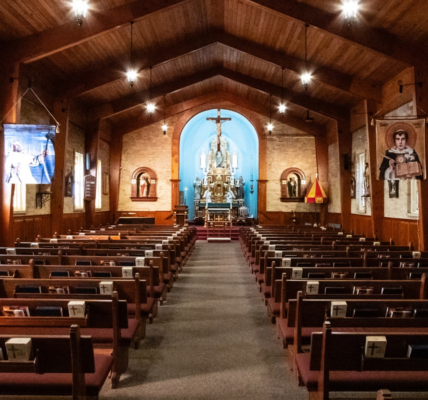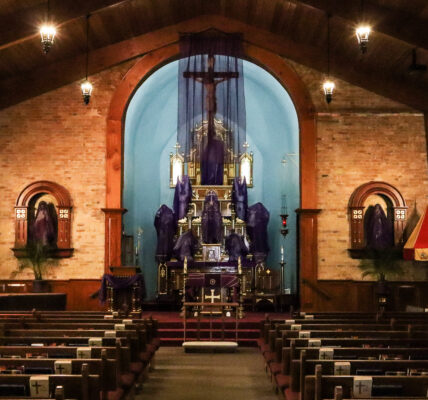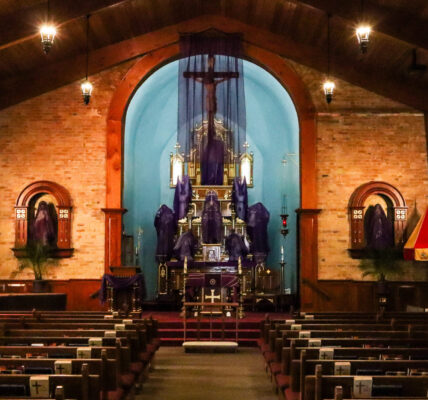I have been suffering a bout of pancreatitis, and the pain is excruciating. Over the last two days, I have asked for prayer on X (formerly Twitter). I’m not asking for prayer for God to take away the pain; I’m just asking for prayer.

ecific problem despite all the pain and suffering is peak selfishness!“
Does God intervene in our problems, suffering, and pain, even when surrounded by them? Yes, He does.
We first must understand that God does not cause suffering; He only permits it.
Sometimes, God permits suffering to keep us from greater suffering later or to preserve us for a greater good. For example, you may have recently been fired from a job, causing you to worry and wonder how you will provide for yourself or your family. In this instance, God may know there is a better job for you, or He may know of a danger where you were working that could cause you spiritual or physical harm.
In my case, I may be suffering great pain, and God may have allowed it so that I would find myself focusing on Him or offering my pain and suffering to God as a sacrifice. In fact, the pain yesterday caused me to visit my parish during Eucharistic Adoration to pray and spend time with Christ.

But does God intervene directly in our problems and our suffering? Yes, most certainly, He does! Think of the prophets of the old covenant and the sacraments of the new. None of that exists without God directly intervening. God is the same yesterday, today, and forever. The Incarnation is the most significant proof that God intervenes directly in human affairs.
God is not a non-interventionist or simply an observer but an active God who does intervene in our lives. Again, the Incarnation, the belief that God became human in Jesus Christ, is the greatest proof of God’s direct intervention in human affairs.
Then, there are the Miracles, both in the Bible and throughout Church history, which are considered “exterior proofs” that God is acting or revealing Himself and intervening in the lives of the faithful. They are seen as signs, not direct proofs, that compel belief but point towards God’s intervention and can lead a person to faith.
Let’s look at what happened to Máximo Napa Castro.
“I want everyone to know that God is great. God is beautiful. God wants us all to pray, to have love in our hearts, to help each other,” said Máximo Napa Castro — known as “Gatón” — a Peruvian fisherman who never lost his faith while being stranded at sea for 95 days until he was finally rescued off the coast of Ecuador.
Máximo was lost at sea, drifting further away from land. “And I knelt in the boat. I said, ‘Whatever may happen…’ But I believe in you. I’m going to get through this. I have to keep my mind focused, not despair, and remain calm.”
During his ordeal, Máximo had to ration food and eventually ran out. For water, all he had was the rain. Did Máximo believe that God would not hear his prayer and help him during all this? No.
“I woke up praying. I slept praying. For almost two months, I don’t think I felt his presence. I thought, ‘Have you abandoned me? Why?’ And I cried, as you might expect. I cried a lot, because I knew the situation I was in.”
In February of 2025, he again experienced the Lord’s presence with him. Around the 10th, he began eating the birds that swooped on his boat. On the 20th, he managed to keep going with the fish that “he had given me. I told him, ‘I know you sent me this fish. Thank you, Father.’”
When Máximo was rescued, he thanked God, telling Him he did it. While being taken into the helicopter, he kept pointing. He was pointing at Jesus and wanted those on the helicopter to see Him.
“I saw him clearly. I saw his whites and his beautiful face. And I told him, ‘You did it, you did it. You, you did it.’ And I fell back and cried. I thanked Him. Let the whole world hear this. I’m taking time to recuperate. I want to do it with all the love God gave me,” he shared emotionally.
Many such mercies and events point to God actively working in our lives. Does this mean praying to God, asking Him to relieve our pain, helping us find a job, or clarifying His direction for our lives peak selfishness?
No, it doesn’t.
Does a child asking their parents for food, a glass of water, or to be tucked in at night indicate a peak of selfishness on the part of the child toward his or her parents? No, it does not.
Praying to God and asking for God’s help is not the peak selfishness on our part, but it shows our dependence on God, as a child does as a parent. When you are in need, in pain, or need help, do not fear turning to God, for He is our Father and will help us, His children. So, pray, and pray without ceasing.




